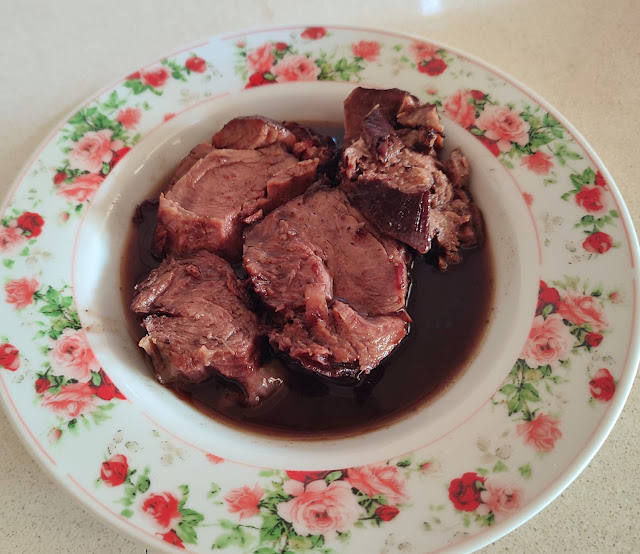Before I proceed with anything, I need to say that this picture doesn’t show the final product- it was taken post much of the cooking but before the final 2 hours of cooking it, sliced and baked in the same sauce, so it ends up darker and is more tender.
This recipe was something that I stumbled upon by chance, since I had some open red wine (either cabernet or merlot) that was slightly starting to sour, and I figured cooking with it would be the perfect use for it (since it was no longer tasty to drink). I used it for a roast I had in my freezer and then was trying to think of something different to do with the roast than carrots and potatoes. Then I thought about what went well with red wine, and mulled wine was what came to mind. I threw in a bunch of spices that went well with wine and voila, that is how it was born.
Regarding the cooking method- beef roast, if not cooking properly, can end up quite dry, as it needs a long time to cook before it softens. I needed beef broth for a recipe. I’ve written about my beef hack, where I pressure cook beef to tenderize it for use in other dishes, and I decided I’d be using that for my roast. First pressure cooked. Then baked with seasoning. Then cut and baked again to soak up the juices.
The result? Absolutely delectable meat that my son said was his favorite way I made beef, so I made it again to be able to write down the recipe this time. Feel free to adjust the amount of sweetener in this recipe- I like my beef sweet but it’s up to you how sweet you want to make it.
Mulled Wine Beef Roast Recipe — Gluten Free, Allergy Friendly, and Delicious
2-4 lb beef roast (I don’t know what kind, don’t think it matters, just something that needs low and slow, as in the cheap cuts of beef)
Water as needed
1 1/2 cups dry red wine (can be cheap wine, no need for good quality)
1 1/2 cups dry red wine (can be cheap wine, no need for good quality)
2 cups broth (from recipe)
1/3-3/4 cup sugar (depending on how sweet you like your meat), or alternative sweetener of choice
1 teaspoon salt
2 onions
1 teaspoon cinnamon
1/2 teaspoon nutmeg
1 pinch ground cloves cloves
1/3-3/4 cup sugar (depending on how sweet you like your meat), or alternative sweetener of choice
1 teaspoon salt
2 onions
1 teaspoon cinnamon
1/2 teaspoon nutmeg
1 pinch ground cloves cloves
1-2 cups water or additional broth
Instructions:
1. Bring beef to a simmer in a pot of water and boil for 2 hours. Alternatively, cook in a pressure cooker for approximately an hour.
2. Strain beef and place in a baking pan with wine, the liquid from cooking the beef (save the rest of the liquid for use in other recipes), sugar or other sweetener, and salt. Taste it and adjust the sweetener and salt if needed. (It’s safe, no raw meat here.)
3. Chop your onion. However you like. I did mine in quarters but it really doesn’t matter. Add to the pan.
4. Add the rest of the ingredients (other than the water/additional broth).
5. Cover and bake at 350 for 2 hours, turning the meat over once or twice in that time.
6. Remove the meat from the pan and refrigerate until cool.
7. Once cool, slice against the grain with a sharp knife, in thin slices. (Not super thin but as thin as you can get with a regular knife. Like in the picture above. Ok haha you cant actually see since you can’t tell how shallow the bowl is.)
8. Return to baking pan so that the juices cover the meat, and add an additional 1-2 cups water or broth, and baked covered again for an hour or two. (The longer cooked, the more tender.)
Enjoy!
What is your favorite way to make a beef roast? What flavors? What method do you use to get the meat as soft as possible and with the flavors saturated into the meat? Does this look like a recipe you’d try?


